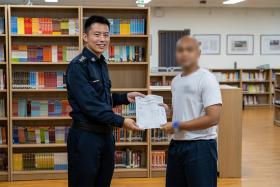Reaching dreams with poly foundation programme
Polytechnic Foundation Programme give students practical start to polytechnic courses
When Mr Tee Jia Xing was in Secondary 4, his father was diagnosed with Stage 4 liver cancer and died soon after.
That was the motivation behind Mr Tee's choice of a science course in the School of Chemical & Life Sciences in Nanyang Polytechnic (NYP).
The 21-year-old graduated on May 9 with a Diploma in Molecular Biotechnology and hopes to do research on liver cancer in the future.
He is one of 220 to 230 NYP students who are enrolled through the Polytechnic Foundation Programme (PFP) yearly.
The PFP, started in 2012, admits the top 10 per cent of Normal (Academic) students into provisional spots at local polytechnics as an alternative to the Sec 5 year and allows them to continue their poly education if they pass all the modules.
PFP is showing optimistic results, according to Education Minister Ong Ye Kung in his speech for Budget 2018, and MOE is planning to expand the yearly intake across the polytechnicsfrom 1,200 to 1,500.
He said: "The norm is that 55 per cent of each cohort score a GPA of 3.0 and above, but 70 per cent of PFP students achieved it. Dropout rates for PFP students are also much lower than average.
"Given the right encouragement and a chance to prove themselves, especially in an area that they enjoy doing, the students will do their best, and will have a good chance of doing well."
This sentiment holds true for Mr Tee. "I did not have to take several subjects such as humanities and Chinese language in PFP and could focus on science, which was what I really wanted to do.
He added: "It was less academically focused and more practical and hands-on than in Secondary 5 or JC."
During his PFP, Mr Tee mostly took modules related to the course that he hoped to be pursuing in his first year in poly - namely human biology, organic and inorganic chemistry, and mathematics.
ADAPT
He said: "The modules are similar to the O-levels syllabus but have the added benefit being adjusted to our specific courses, so it also helped us adapt to the system quicker than others."
He explained that the Grade Point Average (GPA) in PFP is independent of the GPA in subsequent years and that reduced the pressure to do well. This gave him the space to absorb the material covered.
While studying at poly, Mr Tee worked part-time at Reste Laboratories as a medical technologist.
He is now waiting to start his national service, after which he will begin his degree in physiotherapy at Singapore Institute of Technology, which combines his love for science, healthcare and his passion for weightlifting.
Miss Ellen Wong, 21, who joined PFP four years ago at Ngee Ann Polytechnic (NP), graduated on May 4 as the top student and Gold Medallist in Business and Social Enterprise.
She did this while helping her family pay off debts by taking on several part-time jobs.
She said: "PFP was very good for me, because it gave me the change of environment I needed to work hard. I didn't like to study in Secondary 1 and 2 and was always playing with my classmates, so I got a lot of C's and D's."
Miss Wong added: "PFP also helped me to better handle my assignments in poly, as I knew the assignment criteria and expectations better than my friends who entered poly after the O Levels."
She has secured a place in Singapore Management University (SMU) for Business Management via its early admissions exercise. She hopes to open a vegan ice cream shop one day, as well as an inclusive gym where people with disabilities can work out with able-bodied peers.
She said: "I've always wanted to work in the corporate world while helping people who are in need. PFP was the starting point for me where I was exposed to some of the issues that were happening around the world. That was when I realised that I wanted to do something for the community in the future."
Get The New Paper on your phone with the free TNP app. Download from the Apple App Store or Google Play Store now



